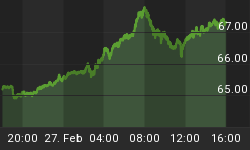The trade gap narrowed today and that is a good thing.
Last month the trade gap was -47.1 billion, revised to -47.0 billion. This month the trade gap narrowed to -40.4 billion a bit better than the Bloomberg Econoday consensus estimate of -41.4 billion.
However, consumer goods plunged by $5.1 billion and that has economists concerned about weakening sales across the board.
The analysts are not pleased with the report.
Highlights
The nation's trade gap narrowed in March but, unfortunately, is not a positive for the economic outlook. The gap came in at $40.4 billion in March vs a revised $47.0 billion in February and largely reflects a downgrade for imports which fell 3.6 percent in the month vs the prior month's 1.3 percent rise. Contraction in imports, though a positive for the gap, is however a negative indication for domestic demand, especially in this report as consumer goods show unusual weakness. And indications on foreign demand are also negative with exports, despite the positive effects of this year's depreciation in the dollar, slipping 0.9 percent vs February's 1.1 percent rise.
Imports of consumer goods fell a very steep $5.1 billion in the month followed, in yet another major negative, by core capital goods which fell $1.6 billion. The former points to weak consumer demand and the latter points to weakness in business expectations. Oil was not a factor on the import side, averaging $27.68 per barrel vs February's $27.48 and making for a total petroleum deficit of $3.0 billion vs February's $3.5 billion deficit.
Weakness on the export side is also concentrated in consumer goods, down $1.6 billion in the month, and includes a separate $0.7 billion decline for autos. Industrial supplies are also down. One positive is a $1.3 billion rise in core capital goods which, however, follows a long string of declines. A solid positive is a further gain for service exports, up 0.5 percent in the month and generally reflecting demand for the nation's technical and managerial expertise.
The nation's gap with China, reflecting the decline in imported consumer goods, narrowed very sharply, to $20.9 billion in March from February's $28.1 billion. The narrowing with China offset widening gaps with the EU, at $13.1 billion, and with Mexico, at $5.4 billion, and also with Japan, at $6.7 billion.
Trade data are always very revealing, in this case pointing unfortunately to declining cross-border demand and showing little benefit, at least so far, from this year's decline in the dollar.

Imports down more than imports will help GDP, but autos are looking very weak all around. The hype over autos yesterday (see US Auto Sales Back on Track? Another Record Year?) seems more than a bit overdone.
I will have more on autos in a bit.















